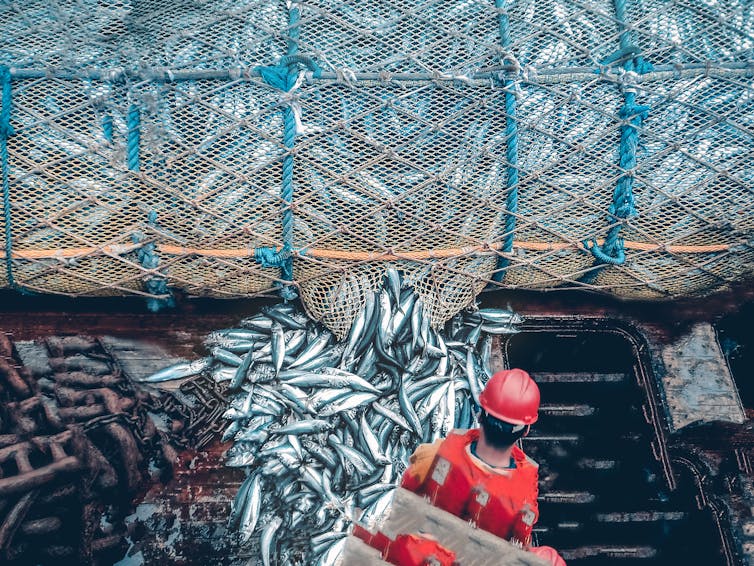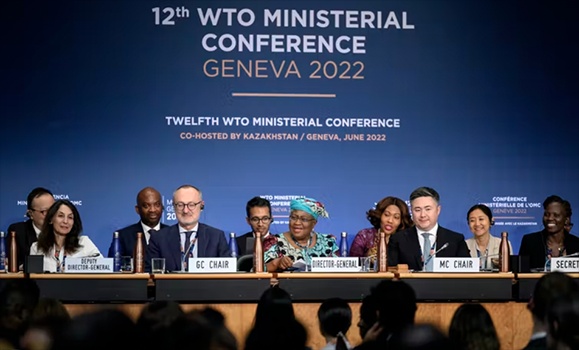51�Թ� the author: Wilf Swartz is an associate professor in Dalhousie's Marine Affairs program.
The World Trade Organization reached an on June 17, prohibiting member countries from funding illegal fishing and fishing of overexploited stocks.
After decades of failed negotiations, this new agreement is a massive step toward achieving the United Nations Sustainable Development Goal 14 — . While this new agreement fails to address the “harmful” subsidies that fund overfishing, the to restrict these programs.
This idea of “harmful” subsidies, however, overlooks the diverse conditions of fisheries worldwide. It ignores the important role government interventions play in the economic security and .
Using oversimplified terms, like harmful, to define subsidies can have real-life consequences. Ignoring the nuances of fisheries under the guise of “illegal, unreported and unregulated fishing,” for example, has already led to .
As a fisheries economist involved in the 2011 WTO negotiations, and who has followed this issue since then, I believe we need to have more nuanced discussions about the role of fisheries subsidies — even the nominally harmful ones — to avoid further marginalization of small-scale fishers.
‘Harmful’ subsidies are not always harmful
are government programs that reduce the operating costs of fishing, and leads to excessive fishing and overexploitation.
The notion of “harm” is focused primarily on overfishing. However, this description ignores how subsidies can be used as key policy tools that address fisheries-related social issues.

Such subsidies include providing that considers the seasonal nature of fishing, government-backed loans for independent harvesters when , and .
Because these programs are cost-reducing and have potential environmental impacts, they are considered harmful. But this is an inaccurate descriptor because these kinds of subsidies don’t impose a choice between addressing social or environmental concerns.
The link between subsidies and overexploitation can be , such as caps on fishing effort or limits on catch.
Addressing neoliberalism’s legacy
Leading up to the recent rounds of WTO negotiations, harmful subsidies were argued to be a source of inequity for two reasons.
First, industrialized nations were found . Second, the majority of the public funds allotted to fishing sectors were instead of small-scale fishers.
It’s true that some subsidy programs represent of public funds to private corporations. In such cases, it is essential that .
But this does not mean that restricting governments’ ability to intervene will lead to a fair playing field. On the contrary, governments should help small-scale fisheries be more commercially competitive through programs that reduce licence fees or support catch quota acquisitions and those that provide essential infrastructure and services.
Developing coastal nations — particularly — have been locked in decade-long fights over transboundary fish stocks. Their goals that are capable of capturing their fair share of resources.
Given the in these countries, they are unlikely to achieve these aspirations without public financial support.
Simply put, public interventions like subsidies are necessary to remedy the disproportionate market power and access that industrial fleets have accrued under .
Need a more nuanced conversation
Addressing social injustice within communities starts with recognizing their diverse histories, future goals, local management practices, governance structures and the sociocultural and economic roles of fishing in certain contexts.
The new WTO agreement improves global transparency by expanding subsidy notification obligations. Member states will be required to submit any information about new subsidies programs to the WTO, where the committee will assess them to ensure member states are complying with the new agreement. In order for the new agreement to be meaningful, this new notification mechanism must be publicly accessible.
Future attempts to restrict how sovereign nations support their domestic fisheries and coastal communities must proceed with caution. We must be aware of the limits in a top-down, international approach, and avoid unnecessarily constraining governments’ capacity.
We must ensure that the actions to control overfishing must not lead to further marginalization of small-scale fishers.
Now that the mandate for the WTO agreement on fisheries subsidies is embedded within the UN Sustainable Development Agenda, future negotiations must protect and enhance ocean equity. This starts with more nuanced conversations about so-called harmful subsidies.![]()
This article is republished from under a Creative Commons license. Read the .

